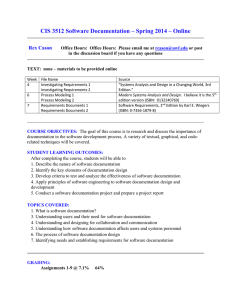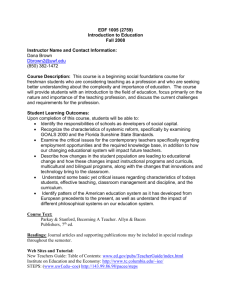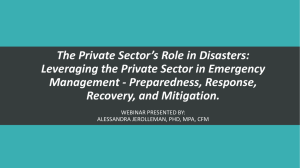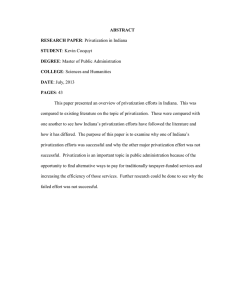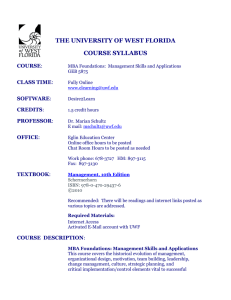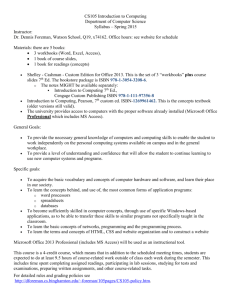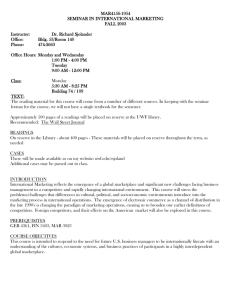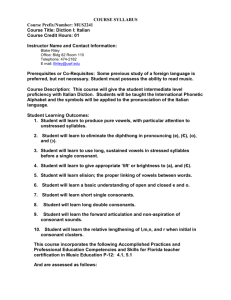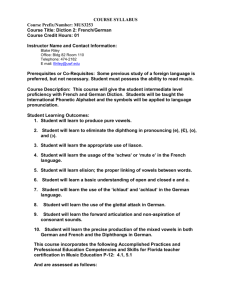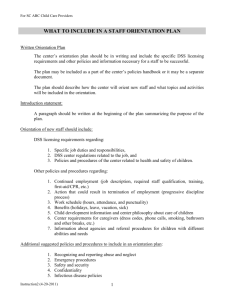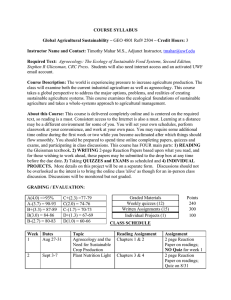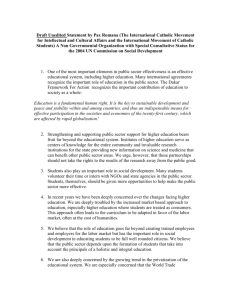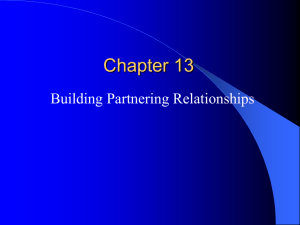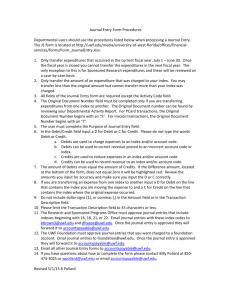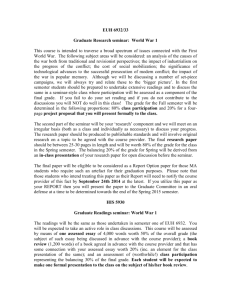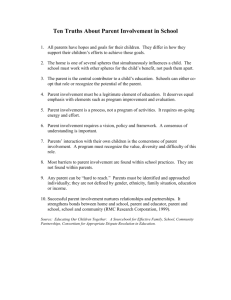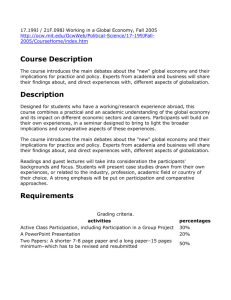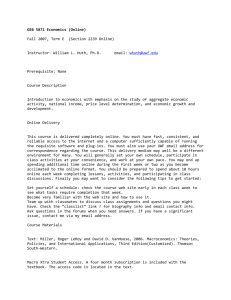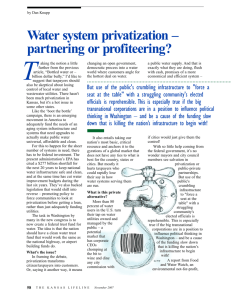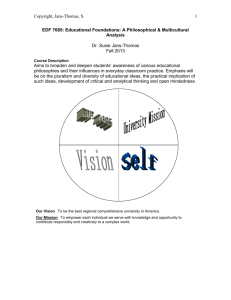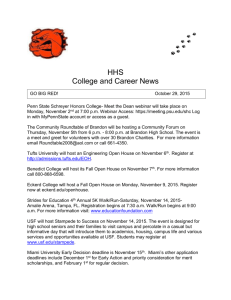COURSE SYLLABUS PAD 6275 The Political Economy of Public
advertisement
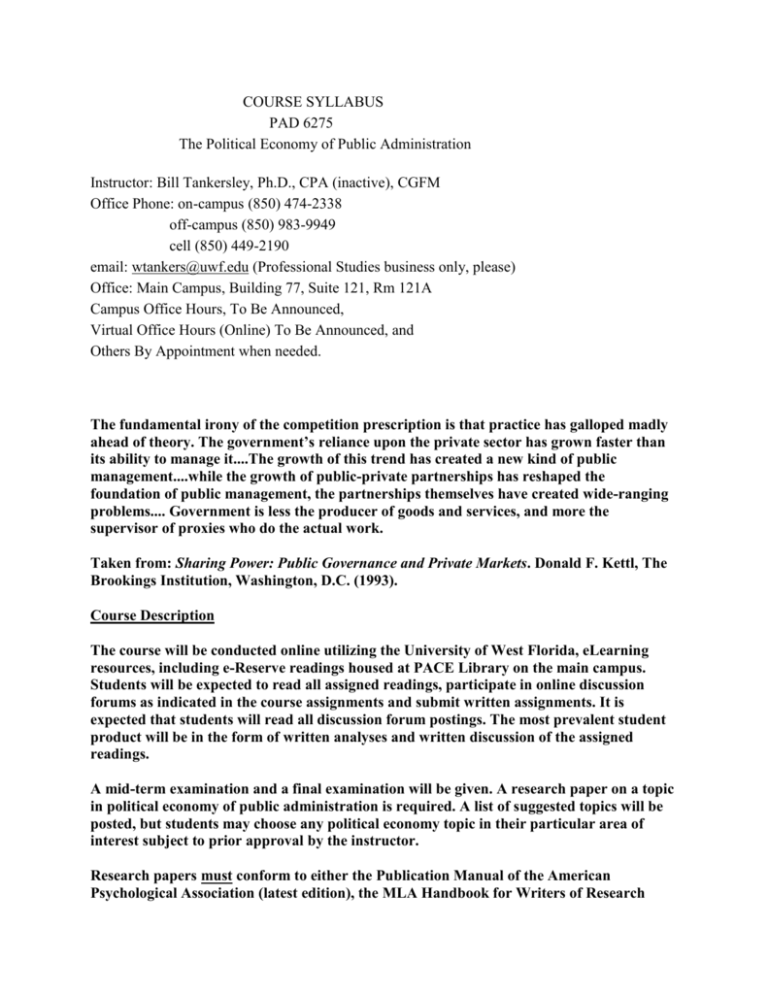
COURSE SYLLABUS PAD 6275 The Political Economy of Public Administration Instructor: Bill Tankersley, Ph.D., CPA (inactive), CGFM Office Phone: on-campus (850) 474-2338 off-campus (850) 983-9949 cell (850) 449-2190 email: wtankers@uwf.edu (Professional Studies business only, please) Office: Main Campus, Building 77, Suite 121, Rm 121A Campus Office Hours, To Be Announced, Virtual Office Hours (Online) To Be Announced, and Others By Appointment when needed. The fundamental irony of the competition prescription is that practice has galloped madly ahead of theory. The government’s reliance upon the private sector has grown faster than its ability to manage it....The growth of this trend has created a new kind of public management....while the growth of public-private partnerships has reshaped the foundation of public management, the partnerships themselves have created wide-ranging problems.... Government is less the producer of goods and services, and more the supervisor of proxies who do the actual work. Taken from: Sharing Power: Public Governance and Private Markets. Donald F. Kettl, The Brookings Institution, Washington, D.C. (1993). Course Description The course will be conducted online utilizing the University of West Florida, eLearning resources, including e-Reserve readings housed at PACE Library on the main campus. Students will be expected to read all assigned readings, participate in online discussion forums as indicated in the course assignments and submit written assignments. It is expected that students will read all discussion forum postings. The most prevalent student product will be in the form of written analyses and written discussion of the assigned readings. A mid-term examination and a final examination will be given. A research paper on a topic in political economy of public administration is required. A list of suggested topics will be posted, but students may choose any political economy topic in their particular area of interest subject to prior approval by the instructor. Research papers must conform to either the Publication Manual of the American Psychological Association (latest edition), the MLA Handbook for Writers of Research Papers (latest edition) or the current writing style prescribed by the American Political Science Association. No credit will be given for papers judged to violate the University of West Florida Plagiarism Policy. Length of research papers is to be at least a MINIMUM of eighteen pages not including charts, appended material and reference lists. They should be typed and double-spaced with font approximating Times New Roman 12. A separate folder is available in the course Contents with more detailed explanation of research paper requirements, including the date due. Student Learning Outcomes and Topics Covered: Students will be expected to develop the ability to utilize the concepts introduced in the assigned readings to analyze public policy particularly focusing on interaction of the public and private sectors of the American economy with the political environment in which they function. Specific topics of concern include: I. What is Political Economy: Why is it important that U.S. Public Administrators consider this topic? II. Assumptions about Human Nature: Economic Man and American Political Economy III. Political Structure: Models for Separation of Powers, Controlling Factions and Avoiding Tyranny of the Majority IV. Market Structure: Models of Perfect Competition, Monopoly, Monopolistic Competition V. Market Failure and Bureaucratic Failure: Recognition, Comparison and Contrast VI. Socio-economics: Models of Encapsulated Competition and Interventionist Power VII. Polyarchy: Volition Formation, Precept Control, Organizational and Elite Power VIII. Democratic Values: The issue of Corporate Power in a “Freely Competitive” Market System IX. The New Public Management: Formal Relationships between Government and Business, i.e., contractual and regulatory governance of the private sector. X. Contracting Out/Privatization of service production in the U. S.: Is privatization simply a revisionist version of planner sovereign markets and centralized control? What is the impact of interventionist power on privatization and public/private partnerships? XI. Who Shall Guard the Guardians: or, Is the Fox in the Chicken House? Required texts: Sackrey, C. and Schneider, G., with Knoedler, J., Introduction to Political Economy, (lFourth Edition) , Economic Affairs Bureau, Inc., Cambridge. Savas, E.S., Privatization and Public-Private Partnerships (2000), Chatham House, ISBN 1-56643-073-9 (pbk.) Lindblom, Charles D., The Market System: What It Is, How It Works, and What To Make of It (2001) YALE (NB) ISBN 0-300-09334-9 (pbk.) Duffy, J., Economics (1993) Cliffs Notes ISBN 0-8220-5324-1 Supplemental electronic reserve, website references, and online documents will be utilized. Student performance will be evaluated as follows: Item Weight Mid-term Exam .15 Final Exam .15 Online Discussion/Analysis* .50 Written Research Paper .20 Total 1.00 *Note regarding Online Discussion/Analysis: Regular participation is expected. Failure to regularly and significantly participate in class online discussions will have a major detrimental effect upon the student's grade. Special Technology Utilized By Students Required: Adobe Acrobat Reader: http://www.adobe.com/products/acrobat/readstep2.html Expectations for Academic Conduct/Plagiarism Policy: As members of the University of West Florida, we commit ourselves to honesty. As we strive for excellence in performance, integrity—personal and institutional—is our most precious asset. Honesty in our academic work is vital, and we will not knowingly act in ways which erode that integrity. Accordingly, we pledge not to cheat, nor to tolerate cheating, nor to plagiarize the work of others. We pledge to share community resources in ways that are responsible and that comply with established policies of fairness. Cooperation and competition are means to high achievement and are encouraged. Indeed, cooperation is expected unless our directive is to individual performance. We will compete constructively and professionally for the purpose of stimulating high performance standards. Finally, we accept adherence to this set of expectations for academic conduct as a condition of membership in the UWF academic community. ASSISTANCE: Students with special needs who require specific examination-related or other courserelated accommodations should contact Barbara Fitzpatrick, Director of Disabled Student Services (DSS), dss@uwf.edu, (850) 474-2387. DSS will provide the student with a letter for the instructor.
